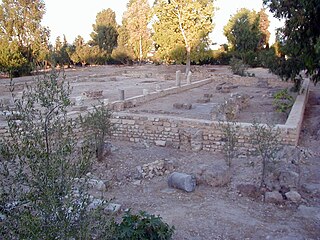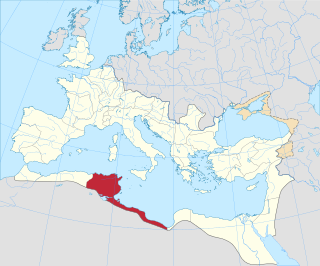Related Research Articles
Pope Miltiades, also known as Melchiades the African, was the bishop of Rome from 311 to his death on 10 or 11 January 314. It was during his pontificate that Emperor Constantine the Great issued the Edict of Milan (313), giving Christianity legal status within the Roman Empire. The pope also received the palace of Empress Fausta where the Lateran Palace, the papal seat and residence of the papal administration, would be built. At the Lateran Council, during the schism with the Church of Carthage, Miltiades condemned the rebaptism of apostatised bishops and priests, a teaching of Donatus Magnus.

Year 250 (CCL) was a common year starting on Tuesday of the Julian calendar. At the time, it was known as the Year of the Consulship of Traianus and Gratus. The denomination 250 for this year has been used since the early medieval period, when the Anno Domini calendar era became the prevalent method in Europe for naming years.

Donatism was a Christian sect leading to a schism in the Church, in the region of the Church of Carthage, from the fourth to the sixth centuries. Donatists argued that Christian clergy must be faultless for their ministry to be effective and their prayers and sacraments to be valid. Donatism had its roots in the long-established Christian community of the Roman Africa province in the persecutions of Christians under Diocletian. Named after the Berber Christian bishop Donatus Magnus, Donatism flourished during the fourth and fifth centuries.

Donatus Magnus, also known as Donatus of Casae Nigrae, became leader of a schismatic sect known as the Donatists in North Africa. He is believed to have died in exile around 355.
Usilla or Usula was a town in the Roman province of Byzacena, now Inchilla in Tunisia.
Possidius was a friend of Augustine of Hippo who wrote a reliable biography and an indiculus or list of his works. He was bishop of Calama in the Roman province of Numidia.

Assuras, sometimes given as Assura or Assur, was a town in the Roman province of Proconsular Africa.
Mensurius was a bishop of Carthage in the early 4th century during the early Christian Church.

Téboursouk is a town and commune in the Béja Governorate, Tunisia. It is located at 36° 27′ 26″N, 009° 14′ 54″E.

The Archdiocese of Carthage, also known as the Church of Carthage, was a Latin Catholic diocese established in Carthage, Roman Empire, in the 2nd century. Agrippin was the first named bishop, around 230 AD. The temporal importance of the city of Carthage in the Roman Empire had previously been restored by Julius Caesar and Augustus. When Christianity became firmly established around the Roman province of Africa Proconsulare, Carthage became its natural ecclesiastical seat. Carthage subsequently exercised informal primacy as an archdiocese, being the most important center of Christianity in the whole of Roman Africa, corresponding to most of today's Mediterranean coast and inland of Northern Africa. As such, it enjoyed honorary title of patriarch as well as primate of Africa: Pope Leo I confirmed the primacy of the bishop of Carthage in 446: "Indeed, after the Roman Bishop, the leading Bishop and metropolitan for all Africa is the Bishop of Carthage."
Secundus of Tigisis was an early church leader and primate of Numidia. He was a leading organiser of the early Donatist movement in Carthage.
Felix, Bishop of Aptunga, in proconsular Africa was a 4th-century churchman, at the center of the Donatist controversy.
Maximian was a 4th-century Bishop of Carthage and founder of a splinter group that left Donatism.

Bagai was a Roman–Berber city in the province of Africa Proconsularis. It must have been of some reasonable size, as it was also the seat of an ancient Catholic bishopric. The ancient city has been identified with ruins at Ksar-Bagaï outside of Baghai, in the Aurès Mountains of the El Hamma District in Khenchela Province, Algeria.
Henchir-El-Meden is a locality and archaeological site in Tunisia.

Melzi was a civitas (town) of the Roman Empire during late antiquity. It was also known as Meditanus.

The Diocese of Bennefa is a home suppressed and titular see of the Roman Catholic Church. Bennefa, identifiable with Oglet-Khefifa in modern Tunisia, is an ancient civitas of the Roman province of Byzacena. and a seat of an ancient Christian episcopal see. The diocese was mentioned by Augustine of Hippo.
Parmenian was a North African Donatist bishop, the successor of Donatus in the Donatist bishopric of Carthage. He wrote several works defending the rigorist views of the Donatists and is recognized as "the most famous Donatist writer of his day", but none of his writings have survived.
Cabarsussi, was an ancient civitas (municipality) and bishopric in the Roman province of Byzacena, that is tentatively identifiable with ruins at Drâa-Bellouan in modern Tunisia. The current bishop is Terence Robert Curtin, auxiliary bishop of Melbourne.
Saint Potamon of Heraclea was a bishop of Heraclea in Egypt who was persecuted under the emperor Maximinus Daza, attended the First Council of Nicaea, then was martyred in Egypt by the Arians. His feast day is 18 May.
References
- ↑ Primianus, Donatist bp. of Carthage Archived 2017-10-25 at the Wayback Machine at Christian Classic Library.
- ↑ Peter Linehan, Janet L Nelson, The Medieval World (Routledge, 2013) p565.
- ↑ Caroline Humfress, Orthodoxy and the Courts in Late Antiquity (OUP Oxford, 2007) p188.
- ↑ Mesnage, Joseph; Toulotte, Anatole (1912). L'Afrique chrétienne : évêchés et ruines antiques. Description de l'Afrique du Nord. Musées et collections archéologiques de l'Algérie et de la Tunisie (in French). 17. Paris: E. Leroux. pp. 1–19. OCLC 609155089.
- ↑ Henry Chadwick, The Church in Ancient Society: From Galilee to Gregory the Great (Oxford University Press, 2001) p388.
- ↑ Shira L. Lander, Ritual Sites and Religious Rivalries in Late Roman North Africa (Cambridge University Press, 2016) p148.
- ↑ Alban Butler, The lives of the fathers, martyrs, and other principal saints (1821), p480.
- ↑ Shira L. Lander, Ritual Sites and Religious Rivalries in Late Roman North Africa (Cambridge University Press, 2016) p148.
- ↑ Primianus, Donatist bp. of Carthage Archived 2017-10-25 at the Wayback Machine at Christian Classics Library].
- ↑ Alban Butler, The lives of the fathers, martyrs, and other principal saints (1821), p484.
- ↑ Augustine. contra. Petil. iii. 34, 40.
- ↑ See also Dr. Sparrow Simpson, St. Augustine, and African Church Divisions (1910), p 52.